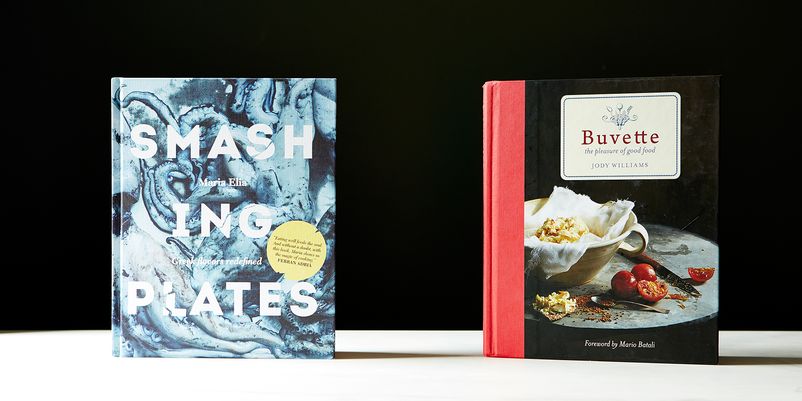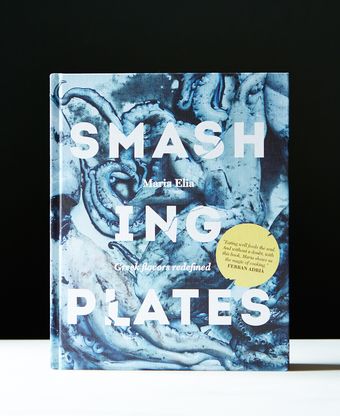I blurb a lot of books. Because I like them. Because smart friends ask nicely. Because, in all honesty, when my name has not been recently blazoned on a new book, I miss seeing my name on a new book, and I recognize that, like showing my face on television, it’s one key to remaining part of the conversation.
Writing short and pithy bursts of praise is tricky business. Lend your name too freely, or render praise too purple, and you earn the label blurb whore. In the circles of writer hell, that mark is one declination above hack and relies on many of the same cheats, like encroaching the smartly alliterative line and abusing the exclamation.
The mailman recently dropped two books at my door: Smashing Plates, a queer, bluish-black thing, with a knotty octopus on the cover and a blurb from Ferran Adrià starburst at bottom-right. And Buvette, a red-spined text at once prim and sexy, chocked with Italian-French bistro recipes by Jody Williams, chef of the eponymous New York City restaurant.
Like the restaurant, Buvette the book is alluring. Witness Williams’s blue cheese-topped salsify in Cabernet-and-honey syrup. And her carrots that loll in a sherry vinegar reduction. Witness the mustard- and rosemary-perfumed gougères that, as Williams promises, fall flat on their faces.
But it took a second and then a third read before my wife, Blair, and I gave ourselves over to Buvette’s charms: Blair baked a loaf of schiacciata bread that turned out just like the pretty picture in the book. And then she roasted a fennel-perfumed chicken that gave her the confidence to roast more chickens.
The recipes in Buvette were clear. The dishes were delicious. The problem was my prejudices: No matter how good the recipes were, no matter how simple the instructions for the Orange and Campari Marmalade read, no matter how pleasantly bittersweet the results tasted, I’ve grown weary of Italian-French mashups that reinforce American obeisance to the so-called grand cuisines.
Smashing Plates, on the other hand, took me places I’ve never been. Like small town, minor island Greece. And a taverna in the Troodos Mountains of Cyprus. What’s more, the book includes a recipe for Sesame & Peanut Brittle Ice Cream that I have yet to make but patiently awaits my summertime attentions.
Some of the Smashing Plates appeal is exotic promise. Some of it is sensual. Read Maria Elia’s homage to her forebears and you get the sense that, if you follow her recipes, you’ll soon be at a table with her family, scarfing Zucchini-Coated Calamari and shrimp swaddled in ouzo mayonnaise. (Forgive me, I’ve already slipped into blurb speak.)
For those reasons, I have chosen Greek mystery over the French-Italian ethic of Buvette. In service to The Piglet and its peoples, I whore today for Smashing Plates by Maria Elia.
Instead of documenting the meals my family has cooked from Smashing Plates -- like the crazy-simple dish of mashed potatoes with kalamata olives that has become my preferred side when grilling steaks for our newly omnivorous 13-year-old son, and the Parsnip Skordalia that redeemed a recent Sunday night dinner of grocery store rotisserie chicken -- I have conceived three blurbs, ready to replace Adrià on the paperback edition.
In sum, they reflect my impressions of the book and its attributes. In abstract, they reflect the bloviate state of back-of-the jacket copy, circa right this hot minute:
1) How to tenderize an octopus by hurling it against a rock (page 80). How to pickle a chicken and tuck it beneath a skein of olive oil and keep it for a week (page 54). How to craft halloumi cheese from goat’s milk and why it tastes better confettied with dried mint (page 34). How to avoid the sharp thorns of a caper bush, and how to vicariously pickle a caper leaf plucked from said bush (page 153). Read this book, follow these recipes, and those skills will be yours.
2) Greeks evidently have a thing for watermelon. You will too after you make Maria Elia’s chile-roasted feta, served hot on a bed of cold watermelon. Or her scallops with watermelon, drenched in raisin oregano dressing, capped with horseshoes of soutzouki.
3) Maria Ellia slanders moussaka. Specifically, she slanders the mousakka depicted in “photographs outside touristy Greek restaurants, which often produce poor, greasy versions.” Until I tried her Moussaka-Stuffed Tomatoes, that’s all I knew. When I made that recipe in the dead of winter, the beefsteak tomatoes I lugged home from our local big box had the texture of balsa. No matter. The results were far from greasy and close to genius.



20 Comments
.